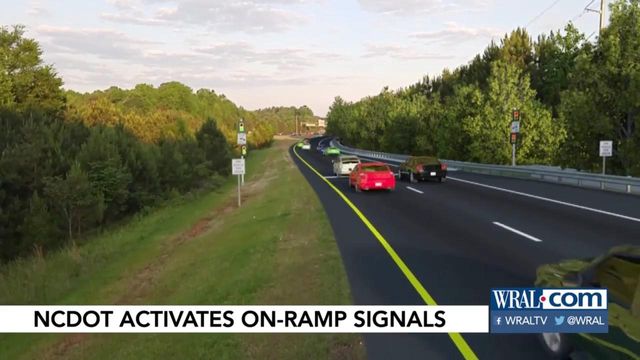Traffic slows on ramps as I-540 lights enter second day
Major changes to several on-ramps went into effect Tuesday on Interstate 540, but officials say the technology needs some "tweaking" before it is reemployed on Wednesday morning.
Posted — UpdatedOfficials with the North Carolina Department of Transportation said a wiring glitch caused some confusion and backups on Tuesday after the new "on-ramp signals" were activated 6:45 a.m. A software glitch caused another backup on Wednesday morning on Leesville Road.
The NCDOT repaired the wiring and reinstated the system for Wednesday, but other modifications still need to be made, like removing some merge signs on the Falls of Neuse Road ramp that could be confusing to drivers.
The technology is brand new to the state, and I-540 in northern Wake County is the first highway to employ it. The four signals are installed on Falls of Neuse Road, Six Forks Road, Creedmoor Road and Leesville Road on-ramps to I-540.
"We're finally approaching the big city status in congestion that we need to do this, eventually we're gonna be widening 540 but this is something we can do now instead of waiting 10 years and just watching traffic get worse and worse," said Steve Abbott, Assistant Director of Communications with the NCDOT.
The signals are essentially stoplights installed on heavily used highway on-ramps that aim to space out the flow of cars getting on the highway.
"You may be backed up a little bit on the side roads or on the ramp because you're not able to free-flow down that ramp until you pass those meters," Abbott said. "But if it improves the congestion and the speeds on 540, you're ahead of the game."
Officials with the NCDOT said the technology was successfully tested across the country, including in cities like Atlanta and Houston, where the signals have decreased travel time by as much as 22 percent. Sensors monitor traffic to activate the signals during peak congestion times.
The NCDOT plans to expand the program to other cities in North Carolina if positive results are seen in Raleigh. Officials are asking drivers to be patient, asserting that the traffic signal system has dramatically decreased commute time in other states.
• Credits
Copyright 2024 by Capitol Broadcasting Company. All rights reserved. This material may not be published, broadcast, rewritten or redistributed.






